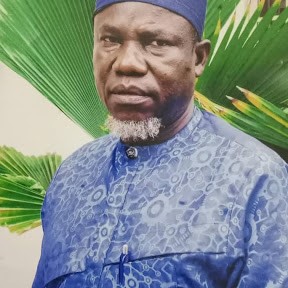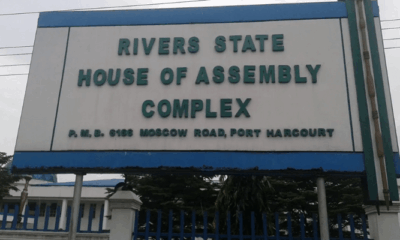Africa
Compulsory Voting: Don’t Force It, Earn It! -By Isaac Asabor
Nigerians are tired, not lazy. They are not apathetic; they are wounded. Give them reasons to believe again, and you would not need to compel them. They will vote, not out of obligation, but out of hope.

In a country where ballot boxes are routinely snatched, elections are brazenly rigged, and politicians treat public offices like personal estates, the idea of making voting compulsory smacks of insincerity and political deceit. The recent push in Nigeria’s House of Representatives to pass a bill that seeks to mandate voting for every citizen of voting age is a misguided attempt to force civic participation in a system that has done little to inspire confidence.
The Bill, which has passed second reading, is being championed by Speaker Tajudeen Abbas and his colleague Daniel Asama Ago. It proposes to amend the Electoral Act, 2002, to make it compulsory for Nigerians to vote in all national and state elections. The proponents argue that this will cure the growing apathy among voters and reduce the menace of vote buying. Deputy Speaker Benjamin Kalu even cited Australia’s experience to buttress his support for the bill.
But let us face the truth. Nigeria is not Australia. And this bill is not only ill-timed but also fundamentally flawed in its reasoning and dangerous in its implications, even as the trust deficit that is inherent in the move is real.
As our lawmakers push for the legislation of this bill, they should have it at the back of their minds that one of the major reasons Nigerians are disillusioned with elections is the fact that their votes rarely count. From one electoral cycle to the next, rigging, vote suppression, violence, and judicial overreach continue to dent the credibility of Nigeria’s electoral process. We saw it in 2007. We saw it in 2019. And even in the so-called game-changing 2023 elections, the hopes raised by the Independent National Electoral Commission (INEC)’s use of technology were dashed by inconsistencies, delays in uploading results, and judicial rulings that many saw as opaque.
Can we honestly compel Nigerians to participate in a system they do not believe in? Can we penalize them for opting out of a game they feel is already rigged? In fact, making voting compulsory in a system that has not earned the people’s trust is not only counterproductive but reeks of authoritarianism.
At this juncture, it is expedient to ask, “Is compulsory voting democratic or dictatorial?” The answer to the foregoing question cannot be farfetched as in a democracy, the right to vote must also include the right not to vote. Compulsory voting is, by default, coercive. It removes agency from the citizen and transfers power to the state to dictate civic behavior. The idea of penalizing someone for choosing not to vote in a flawed system undermines the very foundation of democratic freedom.
Those citing Australia and other countries where compulsory voting is practiced forget the social and political contexts of those nations. In Australia, elections are credible. Public officeholders are held accountable. The judiciary is largely independent. The electoral body is not perceived as partisan. Citizens are treated with dignity. Can the same be said of Nigeria?
Before importing foreign policies, our lawmakers must consider local realities. You cannot plant Australian seeds in Nigerian soil and expect the same harvest. That’s not governance; that is mimicry.
Let us not mistake the symptom for the disease. Voter apathy in Nigeria is not born out of laziness or indifference. It is born out of repeated betrayal by the political elite. Nigerians are tired of queuing under the scorching sun to cast their votes only to see candidates imposed through backdoor manipulations. They are disillusioned by the blatant misuse of power, state capture, and endemic corruption.
Politicians disappear after elections and return four years later with bags of rice and N1, 000 notes. No access to healthcare. No working schools. No clean water. No security. Just failed promises and fancy manifestos that evaporate the moment power is seized.
So when Nigerians choose to stay home on Election Day, it is not apathy; it is a silent protest. A civil resistance. A vote of no confidence in a system that feeds the political elite and starves the ordinary citizen.
If I may ask, “Do these lawmakers even want votes to count? Let us suppose, for a minute, that this bill is passed into law. Will it guarantee that votes will actually count? The answer is a resounding no. Will it prevent ballot box snatching in areas where political thugs are tools of oppression? Will it end vote buying when politicians are ready to bribe voters with wrappers and spaghetti? Will it reform a judicial system that has turned into the final electoral umpire, sometimes delivering verdicts that override the will of the people?
Let us not pretend we do not know what is going on. Many of the lawmakers pushing this bill rode into office on the back of flawed elections. Some of them know they did not genuinely win their seats. It is rich, if not outright hypocritical, for them to now push for a law that compels citizens to validate a system they themselves manipulated to their advantage.
In fact, if lawmakers are genuinely interested in increasing voter turnout and restoring public confidence in the democratic process, they should begin by reforming the electoral system. Make elections transparent, free, and fair. Clean up the voters register, digitize the collation process, and impose real penalties for electoral fraud.
In a similar vein, they should also push for electoral justice. As it stands, the court often decides who wins elections in Nigeria, not the people. The cliché now is “Go to Court”. The judiciary must stop being an extension of the political class. Until this is addressed, voter turnout will continue to plummet, compulsory voting or not.
Compulsory voting is not a silver bullet. It would not solve the underlying issues. In fact, it might worsen them. It may lead to people casting random or spoiled votes just to avoid penalties, thereby distorting the electoral outcome even more.
The energy lawmakers are spending on this bill would be better spent fixing roads, improving schools, securing communities, and ensuring that dividends of democracy reach the people. When citizens see tangible benefits from governance, you won’t need to force them to vote, they will gladly troop to polling stations in droves, with pride and purpose.
The proposal to make voting compulsory in Nigeria is not only tone-deaf but reeks of political gas lighting. You do not heal a broken system by coercing the victims of that system into endorsing it. What Nigerians want is good governance, accountability, and credible elections. Voting should be a right freely exercised, not a legal obligation imposed under threat of punishment.
If the political class truly wants to increase voter participation, then let them behave themselves. Let them govern with conscience, transparency, and empathy. Let them stop treating elections as a four-yearly ritual of deceit and manipulation.
Nigerians are tired, not lazy. They are not apathetic; they are wounded. Give them reasons to believe again, and you would not need to compel them. They will vote, not out of obligation, but out of hope.
Let us not make voting compulsory. Let us make governance inspiring.
























